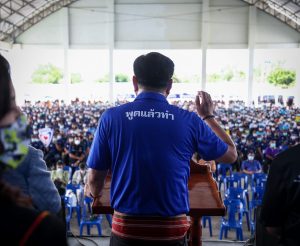The shaky Thai coalition led by Prime Minister Prayut Chan-o-cha recently scored a victory over its opponents, passing the first reading of the 2023 draft budget bill with ease. But there lies a much greater threat ahead, that is the no-confidence motion scheduled to take place some time next month. Failure to navigate through this political storm will instantly force the increasingly unpopular Prayut out of office, which could then trigger an early election ahead of or shortly after the Thailand-chaired APEC Economic Leaders’ Meeting in November.
With the above in mind, all eyes are on the major political parties and their readiness to contest a national election. The current “Big Five” consists of the military-backed Phalang Pracharat Party (PPRP), the Bhumjaithai Party (BJTP), the Democrat Party, the Pheu Thai Party (PTP), and the Move Forward Party (MFP) – the first three being part of the ruling coalition while the latter two are the leading opposition parties. Among these, the BJTP is perhaps the most understudied contender.
The BJTP, headed by the Public Health Minister Anutin Charnvirakul, now occupies some 60 seats in the parliament, and serves as the second largest party in the governing coalition. The party is also the force behind the recent decriminalization of marijuana.
There are several factors why the BJTP has flown under the radar, particularly at the international level. First, unlike other major parties which clearly identify themselves as conservative or progressive/reformist, the BJTP has maintained a strong degree of ideological ambiguity. By joining the Prayut-led coalition and positioning itself as a protector of the crown, the BJTP falls into the conservative camp.
Still, the party has actively campaigned on decentralization and has embraced many defectors from the opposition parties, earning the nickname “snake farm.” Furthermore, the BJTP has been playing the push-and-pull game, pledging support for Prayut’s premiership while threatening to jump ship when things turn sour. The BJTP therefore often comes across not as a moderate middle, but as a party with little political integrity.
Second, as opposed to all of the other big parties, which have lost some prominent members and have undergone major reshuffling following the 2019 election, the BJTP has remained largely intact. In other words, the BJTP has no story or drama to make headlines. People’s attention naturally gravitates towards a more thrilling development, such as the growing infighting within the PPRP and the Democrat Party, or the PTP’s promotion of a new generation of party leaders in an effort to claim youth votes from the MFP.
Third, the BJTP did not field any candidate for the four by-elections (in Songkhla, Chumphon, Bangkok, and Ratchaburi) and the Bangkok gubernatorial election conducted during the first half of this year. Other parties, in contrast, were going all out to flex their muscles and test the waters. The results on the whole were favorable to the PTP and the Democrat Party, not so favorable to the MFP, and highly discouraging for the PPRP.
Upon closer inspection, however, the BJTP is actually very well-prepared. Its ideological fluidity and open acceptance of defectors, on the one hand, have raised the risks of party disloyalty and internal sabotage. Yet, on the other hand, the BJTP has a vast supply of MP candidates and maximum flexibility to play a significant role in any future coalition, conservative or not.
Indeed, the BJTP has quietly been monitoring local political conditions and scouting potential candidates across Thailand’s 400 constituencies. The party has, for instance, managed to penetrate the formidable Democrat stronghold of Phang Nga in southern Thailand by endorsing aspiring local politicians who have a robust support base. With the aim of fielding candidates in all 400 constituencies and winning at least 100 seats, the BJTP has already shortlisted over 200 MP candidates. This is remarkable progress, considering that the BJTP traditionally has had a limited presence beyond its Buriram stronghold in northeastern Thailand.
Lacking a clear ideology, the BJTP has strategically sought to direct voters’ attention to its narrow and controversially memorable policy priorities. The success of its flagship policy to “unlock cannabis restrictions” (and thereby “raising people’s income”) has generated mixed reactions from the Thai public. But, undeniably, this development has reinforced the BJTP’s image as a “party of action,” allowing its leaders to push the party’s new campaign slogan “do as promised” forward with confidence.
Ultimately, it can be argued that the BJTP’s absence from this year’s by-elections and the much-anticipated Bangkok governor election is merely a concealment of strength. While the BJTP is unlikely to win overwhelmingly in the upcoming election, it has a good chance to win big and reach its 100 minimum parliamentary seats target, drive a hard bargain, and occupy some key ministries in the next government.

































